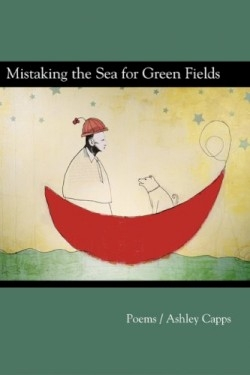Mistaking the Sea for Green Fields
Just past first adulthood, there is a time of contradictions and disappointments brought on by the irreconcilable possibilities and longings of the first twenty-odd years. There nothing loves you and nothing is waiting to transform into anything else. This is neither unusual nor compelling. These poems are rescued from being an overplayed quarterlife crisis by the poet’s irresistible compulsion to find a path to engage life, despite all the times she’s been left floating.
This collection, Capps’s first book, won the 2005 Akron Poetry Prize selected by Gerald Stern. She also won the 2000 Emerson Prize for Poetry at Ohio University, and received her Master’s of Fine Arts from the University of Iowa Writers’ Workshop.
God, love, abandonment, poetry: the themes here can hardly get bigger. Capps keeps them in check with an irreverent, familiar tone. In “Coffin Birth (One Theory, Lord),” she shows reverence by capitalizing the “You,” but doubts if God is even there: “We are hungry without You, but we are like goats / in the absence of grass.” While the God she perceives is a counterfeit notion, she still longs for her idea of God.
The title poem is a strong associative piece about how people are misled about their perceptions. It begins with her aunt’s suicide and ends with a story of early sailors who, delirious, sometimes mistook the ocean for dry land. They drowned, “even though they thought it was real, though / they thought they were going home.” Most poems in this book are trying to find home, yet the narrator is always left out in the elements.
These poems occur just beyond the disappointment, in the moment when the pain has subsided just enough to allow an effort towards logic. There is no giving up here, no wallowing in self-pity. Poetry itself emerges as the organizing principle. In “The Nearest Simile is Respiration,” which is dedicated to poetry, she writes, “I was boozed I was doped I was maybe / a floozy before you knew me.” With poetry, she can “back-float / the massy and heretofore unnavigable childhood / algal blossoms.” It is the way in and the way out.
Though sprinkled with arresting lyrical images, the collection is primarily driven by concepts and Capps’s ironic and acutely self-aware voice. Tending towards the formal while using surprising everyday language, this is poetry for the eye rather than the ear. Capps experiments with the shape of the line on the page, with breaks often mimicking pauses in thought development rather than intake of breath.
The collection is relatively flat in terms of emotional center, and oddly bottom-heavy, with the majority of the most successful pieces clustered in the second two of its four sections. Regardless, Capps is undeniably a promising young poet, well worth watching to see how she will navigate the next set of rapids.
Reviewed by
Naomi Millán
Disclosure: This article is not an endorsement, but a review. The publisher of this book provided free copies of the book to have their book reviewed by a professional reviewer. No fee was paid by the publisher for this review. Foreword Reviews only recommends books that we love. Foreword Magazine, Inc. is disclosing this in accordance with the Federal Trade Commission’s 16 CFR, Part 255.

